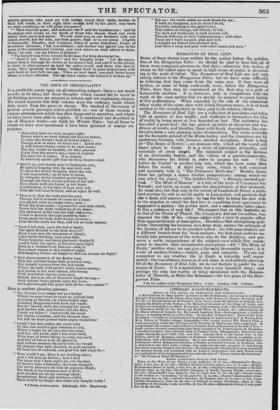THE HOPE OF IMMORTALITY*
Is a creditable poem upon an all-interesting subject : there is not much novelty in its ideas, but those thoughts which cannot fail to occur to all thicildng persons are arrayed in solemn and not unpleasing stanzas. We would separate this little volume from the ordinary trash which daily issues from the press in rhyme. We marked in the course of perusal several passages which gratified us : one of them records a curious phenomenon which has often happened to ourselves, and which we have never been able to explain. It is mentioned and described in one of HOGG'S works—we think his Winter Tales : but all those to whom we have ever mentioned it have been ignorant of similar experience.
" How often have we seen, in open light, Scenes which we have beheld and known before, In some dim dreamy land of distant night— Though how or when we know not ! Acted o'er A well-known drama seems to be once more ; The very words we breathe, ere they proceed Forth from the actor's lips,—and we explore The issue ere it comes. It is, indeed, By heavenly spirits' gift that we these lessons read.
" Bared up, and closely pent in loathsome clay, By natural longings led, the soul dab seek To leave her dreary dungeon, when the way Is left unguarded,—or at least to speak, In whispers, to her kindred spirits meek, Through the thick-woven grating of her cell : How gladly doth she listen, in her bleak Confinement, to the tales of hope they tell, That she will soon be freed, and all again be well.
"Thus is it, that the bodrand the soul, Though link'd in bands of union for a time,
Are parted, even as. yonder starry pole 1-
From the gross earth.—Upward the soul cloth climb,
Down-falls the body-, wallowing in its slime : The pleasures of the soul are high and purer,
Fitted to flourish through unending time : From earth the body cloth its joys procure; Foul like the earth are they, and but an hour endure.
"Have I not seen, upon the bed of death, The spirit nourish as the flesh decay'd? Have I not seen the tenement of breath, Life's feeble dwelling, into ashes fade, While brighter, and more gloriously display'd, Look'd forth the spirit, in her own pure light, Even as a visitant from Heaven—delay'd For a short season in this world of night,
Mid tangling briers—at length to Heaven resume its flight!
"Half disencumbeed of the fleshly load, That her celestial frame hath press'd so long, She looketh upward from the dull abode Which she bath held earth's lowly scenes among; And joying in her near release, and strong With renovated vigour—even now,
Behold, she is as one of Heaven's bright throng—
Such radiant lustre gleams upon her brow,
Such glorious god-like grace doth all her acts endow I" Here is another pleasing passage.
"The Present ever seems but as a bridge Which we must tread to reach an untried land .Awaiting us beyond, on whose bright edge Deluding Happiness holds forth her wand ; But lo ! already hath she changed her stand, And farther still, and farther still she flies; Vainly we follow ! Underneath the hand The cluster crumbles, and the blossom dies; . Yet still we must pursue these empty mockeries !
"Could "but find within the circle wide Of this vast world a spot whereon to rest, Where I might lay all care and fear aside, And feel, and know, that I was truly blest, With hope of better things to come repress'd, And fear of future evils all destroy'd, And restless memory banish'd from my breast
Of pleasure that hath charm'd, or grief. annoy'd,
Of woes but ill endured, and good but half enjoy'd,— " Then'WoUld I say; Here is my dwelling-place, And I will seek no farther; here I find The home that I hem sigh'd for o'er the face Of Earth's wide wilderness, the home design'd For me by Heaven's all-wise all-gracious Mind ; The blank of my existence now is fill'd ; And satisfied are all my cravings blind; Imagination, fierce and stubborn-will'd, Thou need'st no longer now thine airy temples build
* A Poem, in four parts. Edinburgh, 1829. Blackwood.
" But.no ! the earth yields no such home for me ; It hath its dungeons, and in these I dwell, Fearfully listening to the jailor's key, That comes of change, not liberty, to tell ; For dark and loathsome is each narrow cell, Though differing in their loathsomeness ; and when From one I have escaped, glad and well, I straight am forced into another den, And there I weep and pine with other heart-sick men."


















 Previous page
Previous page